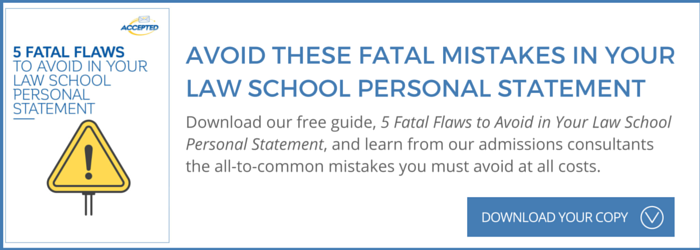
While there’s no getting around the fact that LSAT scores and GPA matter a great deal in law school admissions, the personal statement is the one place where law school admissions faculty get to know you and your reasons behind studying law.
Below are 5 tips – based on real-life scenarios – that have successfully helped my clients get into law school, even when their scores were on the low end for their schools of choice.
1. Write for clarity – not for “literary.”
Sometimes, my clients read law school personal statements that are written like beautiful poetry. Many of those essays are successful. But, there are a lot more law schools grads who aren’t poets. It’s more important to be CLEAR and SPECIFIC than it is to write inspirational phrases.
2. Highlight your work experience – it counts for a lot.
I have had a lot of clients who are able to use their work experience to show maturity and growth beyond undergraduate. Especially if you have been working for more than one year, it’s important to talk about that work in a way that highlights the skills you gained from the job. The most successful essays show how the applicant has matured – especially in terms of working with others – as evidence they are ready for law school.
3. Think about how you would approach the law and try to integrate that into your essay.
I often explain the best personal essays in terms of talking both about internal experiences and external experiences. In other words, describing a particular experience you had is important and valuable, but the essay must also explain how that experience changed the way you thought about others and yourself. Law is about how individuals interact with society, and schools value individuals who are capable of thinking about themselves and others in that light.
4. Combine the professional and the personal.
In line with the advice above, the very best essays combine the personal and the professional. If you have a unique background, how has that contributed to your work (paid or unpaid)? How have you used your own personality or skills to help others? Essays that are most successful show connections between the applicant’s personal life and their community or professional life.
5. Be genuine.
The most important aspect of any essay is a sense that the writer is being genuine. Unfortunately many of my clients initially try to replicate the essays of others or a writing style they admire. I then work with them to restore their voice to their writing.
If you struggle with finding your own voice, try writing the first draft of your essay in the form of a letter to an acquaintance or colleague – someone who knows you, but not very well. Explain in your own words why you are interested in law school. Opt for simpler words and shorter sentences over convoluted phrasing that “sounds good.” Remember that the content of the writing is always more important than the sound of it. “Fancy” writing that is devoid of content simply turns the reader off.
Many people approach writing their personal statement with dread, even those who think of themselves as strong writers. Remember that the law school personal statement is a very specific form of writing with its own conventions – it’s not a poem, a novel, or a screenplay. It needs to be both personal and professional, providing the reader with insight into how you think and how you act.
My most important tip for every applicant is to give yourself enough time to revise the personal statement and to get another’s point of view on the content and writing.
Work one-on-one with a law school admissions expert who will guide you through the process of creating a winning personal statement. Our admissions consultants have read thousands of personal statements and know the exact ingredients of an outstanding one. Check out our admissions consulting services, work with an admissions expert and get Accepted!
Jessica Pishko graduated with a J.D. from Harvard Law School and received an M.F.A. from Columbia University. She spent two years guiding students through the medical school application process at Columbia’s Postbac Program and is a former Accepted admissions consultant. Want an admissions expert help you get accepted? Click here to get in touch!
Related Resources:
• From Example to Exemplary, a free guide
• 5 Mistakes to Avoid in Your Law School Personal Statement
• The Miraculous 15-Minute ROUGH, ROUGH Draft


